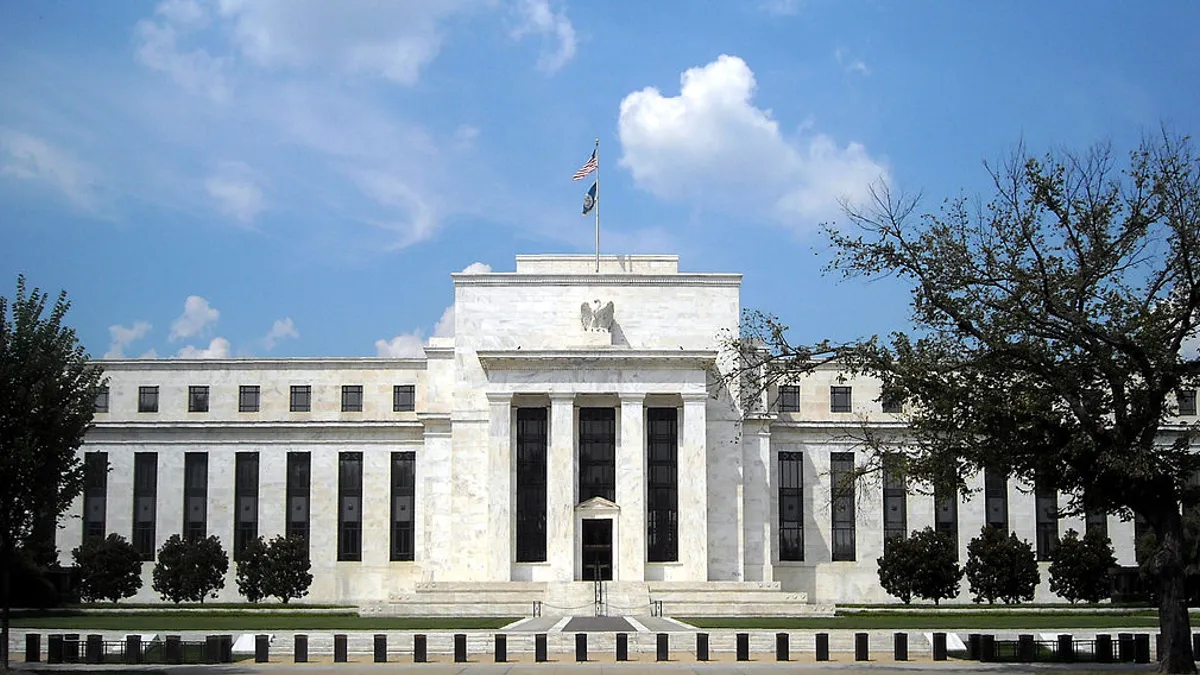Dive Brief:
- Paul Volcker, who served as chairman of the Federal Reserve from 1979 to 1987 and proposed a ban on proprietary trading after the 2007-08 recession, died Sunday at age 92.
- Volcker’s policies helped rein in inflation, which had climbed to 11.8% when President Jimmy Carter named him Fed chief and peaked at 14.8% in March 1980. But those policies also triggered a recession and contributed to Ronald Reagan’s landslide election. Americans stopped buying homes and cars, and the unemployment rate spiked to 10.8% by 1982. Bad loans and bankruptcies skyrocketed.
- In 2008, President-elect Barack Obama tapped Volcker to lead the Economic Recovery Advisory Board. A weakened version of his namesake, the "Volcker Rule," was incorporated into the 2010 Dodd-Frank Act, leading Volcker to question the Obama team’s commitment to the economy. Trump administration officials have since further neutered the rule.
Dive Insight:
Volcker’s career as an economist began in 1952, when he took a job at the Federal Reserve Bank of New York, according to Bloomberg. He left five years later for Chase Manhattan Bank.
Volcker took his first job in Washington in 1962, as director of the Treasury Department’s Office of Financial Analysis, during the Kennedy administration. He served as deputy undersecretary of monetary affairs under President Lyndon Johnson, and returned to Chase in 1965.
As undersecretary of treasury for monetary affairs in 1971, Volcker played an important role in President Richard Nixon’s decision to suspend gold convertibility to the dollar.
As president of the New York Fed from 1975 to 1979, Volcker pushed monetary restraint and high interest rates. "Sometimes we still hear the argument that in time we can learn to live with inflation," he said in a 1978 speech, according to Bloomberg. "But experience suggests the contrary — that this powerful economy of ours will simply not work smoothly or at anything like maximum efficiency or output when there is pervasive uncertainty about the price level."
Volcker apparently was not President Carter’s first choice to lead the Fed, according to The New York Times. Carter’s aides warned that Volcker might drive the economy into recession.
In taking the job, Volcker strained his finances and his family life. Volcker had been frustrated that the Fed had vowed to counteract inflation for more than a decade, but repeatedly shied away in the face of recession.
Volcker’s "Saturday Night Special" on Oct. 6, 1979, began with a 1 percentage point increase in the rate Fed banks charge financial institutions, to 12%. He steered the Fed toward a focus on limiting money supply growth. The prime rate, which banks charge their most creditworthy customers, nearly doubled by November 1980, peaking at 21.5%, according to The New York Times.
As the home market stalled, homebuilders mailed chunks of two-by-fours to the Fed’s headquarters. A bodyguard was assigned to Volcker after a man entered the Fed building with a sawed-off shotgun, revolver and knife, according to the book "Secrets of the Temple," by William Greider.
"We were 'lashed to the mast' in pursuit of price stability," Volcker wrote in his 2018 memoir, "Keeping At It." "Did I realize at the time how high interest rates might go before we could claim success? No."
When Volcker left the Fed in 1987, the central bank’s benchmark rate was at 6.75%, inflation had slowed to about 4%, and the economy was in the fifth year of an economic expansion.
Former Fed chairman Ben Bernanke told The New York Times Volcker came to represent independence. "He personified the idea of doing something politically unpopular but economically necessary."
When recession reared its head again in the late 2000s, Volcker wanted to bar deposit-taking banks from making speculative investments on their own account, and keep them from investing in hedge funds and private-equity funds.
When Volcker left his role as President Obama’s Economic Recovery Advisory Board chair, banks argued his proposal would excessively restrict their business.
"Paul Volcker, by his own admission, has said he doesn’t understand capital markets," Jamie Dimon, JPMorgan Chase’s CEO, told Fox Business News in February 2012. "Honestly, he has proven that to me."
Regulators issued the final version of the Volcker Rule in December 2013, and it took effect in July 2015. But Volcker remained unsatisfied with the final product.
"They say they’re for it, but their hearts are not in it," he said of Washington officials in Ron Suskind’s 2011 book "The Confidence Men."
President Trump ordered agencies in 2017 to rewrite the rule. Volcker complained in an August 2019 letter to Fed Chairman Jerome Powell that regulators had used “simplification” as an excuse to weaken the rule to the detriment of the financial system.
Volcker is survived by his wife; a son and a daughter; a sister; and four grandchildren.














